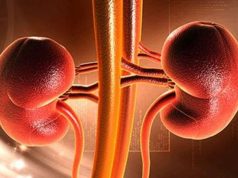Predictors of T2D include intrapancreatic fat percentage, pancreatic fractal dimension, plaque severity between L1 and L4
FRIDAY, July 8, 2022 (HealthDay News) — Use of deep learning may identify abdominal computed tomography (CT) biomarkers that can help diagnose type 2 diabetes mellitus at an earlier stage, according to a study published in the July issue of Radiology.
Hima Tallam, from the U.S. National Institutes of Health in Bethesda, Maryland, and colleagues examined abdominal CT biomarkers for type 2 diabetes using fully automated deep learning among 8,992 patients, 572 of whom had type 2 diabetes mellitus. Noncontrast abdominal CT images were collected from patients who underwent routine colorectal cancer screening from 2004 to 2016.
The researchers found that the deep learning model had a mean Dice similarity coefficient of 0.69 ± 0.17 for the pancreas, which was similar to the interobserver Dice similarity coefficient of 0.69 ± 0.09. In a univariate analysis, compared with those without diabetes, patients with diabetes had lower pancreatic CT attenuation and greater visceral fat volume. Those with diabetes also showed a progressive decrease in pancreatic attenuation with greater disease duration. Pairwise areas under the receiver operating characteristic curve (AUC) of 0.81 and 0.85 were seen between patients without and with diabetes who were diagnosed 0 to 2,499 days before and after undergoing CT, respectively, in the final multivariable model. Adding clinical data did not improve CT-based AUC performance in a multivariable analysis (AUC, 0.67 for the CT-only model; AUC, 0.68 for the CT and clinical model). Intrapancreatic fat percentage, pancreatic fractal dimension, plaque severity between the L1 and L4 vertebra levels, average liver CT attenuation, and body mass index were the best predictors of type 2 diabetes.
“We ultimately hope that the CT biomarkers investigated herein might inform diagnosis of early stages of type 2 diabetes and allow patients to make lifestyle changes to alter the course,” the authors write.
Two authors disclosed financial ties to the medical technology and health care industries.
Abstract/Full Text (subscription or payment may be required)
Copyright © 2022 HealthDay. All rights reserved.








